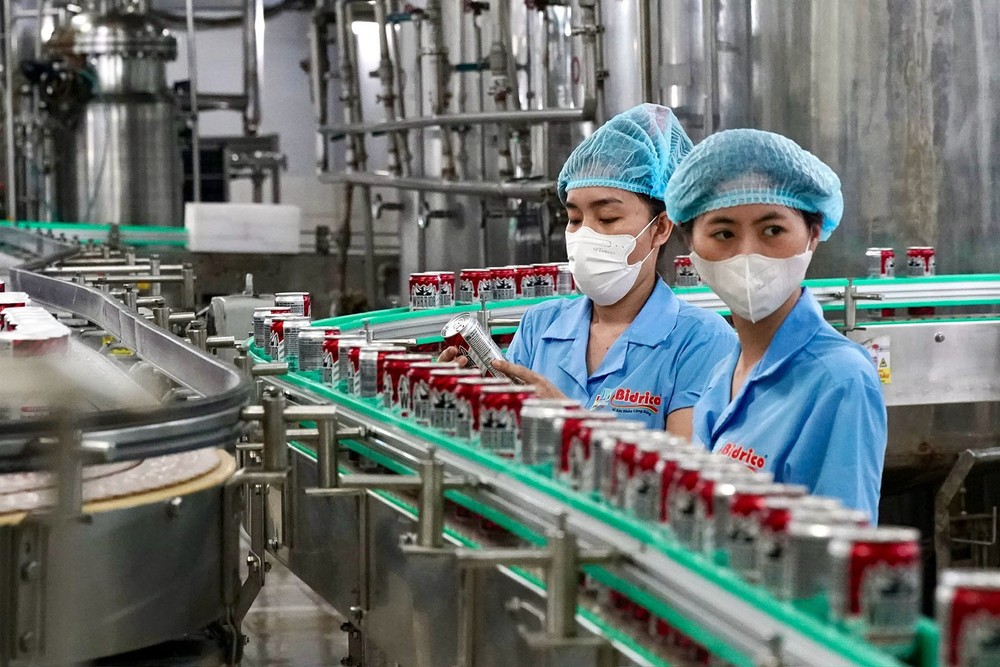 |
Vietnamese businesses have opportunities for Halal food exports |
On average, Tonasia & Beverage Food Company exports 4 tons of dry vermicelli following Halal principles to the European, Middle East, and ASEAN markets every day. Tonasia & Beverage Food Company is one of the Vietnamese businesses that are promoting investment in the Halal market, which is anticipated to rise at a considerable rate during the forecast period.
CEO of Tonasia & Beverage Food Company Dinh Phuc said that to enter the international halal food market –– a growing global trade currently - the company has invested in two factories to process rice into vermicelli in Long An and Dong Thap provinces in the Mekong Delta region.
In order to sustainably enter this difficult market, the company must have organic certification to help it access niche markets sustainably that demand natural and organic products. Several organic certification bodies in Vietnam include Control Union Vietnam. Moreover, the company must standardize input raw materials according to both organic standards and Halal certification standards.
Similarly, after more than 5 years of exploiting the trillion-dollar Halal food market, General Director of Tan Quang Minh Production and Trading Company Nguyen Duc Hien said that five products of the company including confectionery, food and beverages, dairy products, bread and organic foods are being sold in the market.
Moreover, the company must conduct awareness training on Halal standards for all production line workers, establish a control team, and establish production policies. Not only that, the company must clearly understand Muslim culture to design appropriate product packaging including consumers' religious sensibilities, no sensitive images. Packages must be in Arabic language. Marketing activities must follow Islamic laws, principles and guidelines. This includes strategic marketing decisions, planning, communications, delivering products or services to customers,
The General Department of Vietnam Customs’ Statistics shows that up to now, Vietnamese businesses have been quite actively exploiting the Halal market. Vietnam's total import-export turnover to Muslim countries in the ASEAN region from the beginning of the year until now has reached over US$26.37 billion.
Consul General of Indonesia in Ho Chi Minh City Agustaviano Sofjan affirmed that if calculating the total Southeast Asia - South Asia - South Pacific region, the size of the Halal market is about 860 million people. The global halal market is worth about US$470 billion and Southeast Asia alone is $230 billion.
The Food and Agriculture Organization of the United Nations (FAO) announced spending on Halal food by the Muslim community will reach $1,900 billion in 2024 and $15,000 billion in 2050. Thus, in the context of the world economy with many changes in the world today, diversifying export markets and opening new markets still have a lot of room, which is considered the golden key to boosting exports and contributing positively to the country's economic development.
Deputy Director of the Ho Chi Minh City Investment and Trade Promotion Center (ITPC) Cao Thi Phi Van said that Vietnam is a country with great strengths in exporting agricultural and aquatic products in the world and with a geographical location close to consumer markets for Halal products; however, it has not entered in the global Halal market well. Therefore, the Government has approved the project ‘Strengthening international cooperation to build and develop Vietnam's Halal industry until 2030’.
Based on the government’s project, the Ministry of Science and Technology has coordinated with the Ministry of Industry and Trade and relevant ministries to set standards and develop a project of a National Halal Certification Center for signing mutual recognition conventions between countries’ national technical standards paving the way for domestic businesses to expand the Halal market.
Ho Chi Minh City is a place where more than 60 percent of the country's food production enterprises are concentrated, the municipal People's Committee has identified expansion of exploiting the Halal market as a new growth strategy for the export industry.
Vice Chairman of the Ho Chi Minh City People's Committee Vo Van Hoan said that since the beginning of the year, the city has implemented programs with an orientation toward the development of the Halal industry associated with production, green consumption and sustainable export, especially in the food sector - one of the city's four key industries.
In addition, the city is accelerating the development of supporting and logistics industries such as logistics, warehousing, and building more service complexes that meet Halal standards to serve the Muslim population. Thus, the roadmap to support businesses in exploiting the Halal market is available. What businesses need to do is they should proactively convert and focus on production to exploit the trillion-dollar Halal food market effectively.
In addition to agricultural products and food, the Halal market currently has huge consumer demand for herbal, cosmetic, and pharmaceutical product groups, which is an advantage of Vietnam as the country has up to 5,000 types of rare medicinal herbs.
























